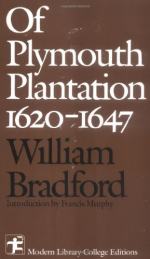|
This section contains 7,593 words (approx. 26 pages at 300 words per page) |

|
SOURCE: “Bradford's Two Histories: Pattern and Paradigm in Of Plymouth Plantation,” in Early American Literature, Vol. 13, No. 2, Fall 1978, pp. 151-64.
In the following essay, Wenska stresses that the two volumes of Of Plymouth Plantation present two distinct histories, the first celebrating new beginnings and the second providing a “retrospective search for significant order” and the meaning of history.
Scarcely twenty years after the discovery of his manuscript history in 1855 and its first publication a year later, William Bradford was acclaimed by Moses Coit Tyler as “the father of American history,” a man whose account of the Plymouth settlement breathed “justice, breadth, vigor, dignity, directness and an untroubled command of strong and manly speech.” Some ten years later, in 1888, Charles F. Richardson chose rather to emphasize Bradford's importance as a “forerunner of literature” and “a story-teller of considerable power.”1 The years since these early literary historians wrote have neither...
|
This section contains 7,593 words (approx. 26 pages at 300 words per page) |

|


